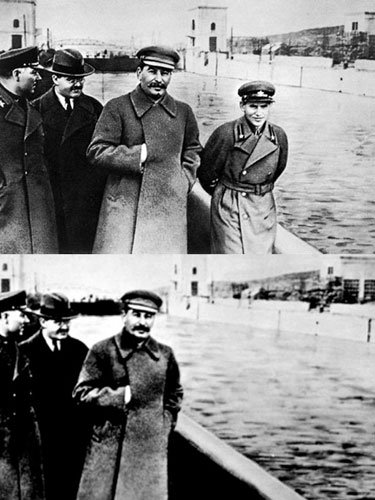Progressives Devouring Their Own
Political Correctness, Princeton University, Racial Politics, Woodrow Wilson

When former head of the NKVD Nikolai Yezhov was purged and executed in 1940 by Stalin, his image, too, was purged from official photographs.
With characteristic Ivy League administrative courage, Princeton President Christopher Eisgruber surrendered to snowflakes of color demands that former Princeton (& US) President Woodrow Wilson be purged for holding racial opinions a century ago deemed politically incorrect today.
Following a 32-hour standoff with student protesters, the president of Princeton University acceded Thursday night to demands that Woodrow Wilson’s name be removed from campus.
In a statement released Thursday evening, the university announced that President Christopher Eisgruber, along with Dean Jill Dolan and Vice President for Campus Life Rochelle Calhoun, had reached an agreement with members of the Black Justice League to resolve a sit-in that had been taking place outside Eisgruber’s office since Wednesday afternoon.
Seventeen students also signed the document addressing their demands for various diversity initiatives, which was inspired by the Mizzou protests, and in the process received immunity from disciplinary consequences related to their demonstration.
In the agreement, the administrators promise to “initiate conversations†with the Board of Trustees on proposals to change the name of the Woodrow Wilson School of Public and International Affairs, as well as to remove a mural of the former U.S. president from a dining hall on campus.
Wilson served as Princeton’s president prior to his election to national office—hence the tributes to him on campus—but the student protesters believe such references to him are unbecoming, insofar as the progressive-minded President was also a virulent racist and staunch segregationist.
In addition, the Black Justice League also secured concessions on related demands for mandatory cultural competency courses for all school employees and the creation of a cultural center for black students on campus.
While the school did agree to expand the availability of cultural competency training, it stopped short of committing to make the training mandatory as the protesters had requested, instead inviting the BJL to send representatives to an upcoming meeting to discuss the possibility of implementing a cultural diversity requirement.
The administrators also pledged to immediately designate four rooms in a building on campus for use by “Cultural Affinity Groups,†promising over the longer term to pursue the creation of “Affinity Housing for those interested in black culture†with the Residential Colleges.
—————————–
Princeton’s eagerness to purge its one-time favorite son is absolutely loaded with delightful ironies, alas! lost upon the ideologically-deranged minority students as well as upon their slimy and invertebrate praecepters.
Yale renaming the residential college previously named in honor of Yale’s greatest contributor to political thought is rather tragic, but Princeton throwing Woodrow Wilson to the wolves of trendy contemporary elite opinion could scarcely be more fitting.
Woodrow Wilson himself would have been among the first to chisel out the name of any distinguished predecessor currently in bad odor with the forces of Moral Uplift and Progressive Thought. One can almost picture Wilson arising from his tomb in order to recant all of his old-time racial and eugenicist positions, and to volunteer to take down his own portrait, while getting in a few unkind remarks along the way about George W. Bush’s invasion of Iraq.
Abraham Lincoln (the dirty racist!) will be next.




